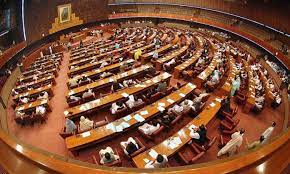F.P. Report
KARACHI: The Supreme Court (Practice and Procedure) Bill 2023 has formally become a law and the National Assembly Secretariat sent it for gazette publication, on Friday.
In the light of completion of all legal rules and regulations, the law was sent for gazette publication.
The National Assembly Secretariat also formally issued a notification after exhausting all stages for bill approval.
A couple of days ago, President Arif Alvi had refused for a second time to approve the legislation aimed at limitting some key powers of the chief justice of Pakistan.
President Alvi sent back the Supreme Court (Practice and Procedure) Bill 2023 to Parliament for a second time for reconsideration, citing ongoing litigation over the matter as the reason.
The bill was first approved by the Cabinet late last month and then passed by both the National Assembly and Senate, but the president refused to sign into law, terming it “colorable legislation” that was “beyond the competence of Parliament.”
He returned it for reconsideration on April 8 and a joint parliamentary sitting reapproved it two days later, despite opposition from Imran Khan’s Pakistan Tehreek-e-Insaf (PTI). President Alvi is a senior member of the PTI.
The PTI and some lawyers’ groups have filed multiple petitions against the legislation with the Supreme Court, which has blocked its implementation until it disposes of all the cases.
According to the Constitution, if the president refuses twice to sign a bill passed by the parliament, it automatically becomes law 14 days after its reapproval.
The legislation’s most notable provision is stripping the chief justice of the power to take a suo motu notice, a legal term that refers to actions taken by courts on their own without a request from any of the parties concerned.
Suo motu notices by Pakistan’s chief justices have long been a source of contention between the judiciary and governments, with several bar councils also opposing the controversial power.
The bill also deprives the chief justice of the authority to constitute Supreme Court benches.
It would also allow three-time Prime Minister Nawaz Sharif, former Premier Syed Yusuf Raza Gilani, and several other parliamentarians disqualified by the Supreme Court under suo motu action to appeal the punishments within 30 days of the law’s enactment.







